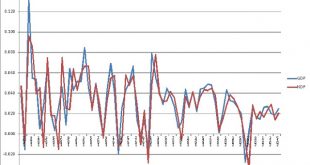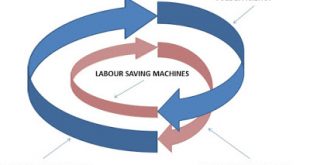At the CEPR blog, Beat the Press, Dean Baker and Jason Hickel are debating degrowth. Dean makes the excellent point that “claims about growth” from oil companies and politicians who oppose policies to restrict greenhouse gas emissions, “are just window dressing.” I also agree, however, with the first comment in response to Dean’s post that his point about window dressing could be taken much further. I would add that economic growth is window dressing for...
Read More »The Anthropocene and the New World
In recent decades all but the wilfully ignorant have had to face two facts: that climate change is taking place and that it is the result of what we humans are doing. The term Anthropocene was coined in 2000 in recognition of that latter hugely important fact. When had this new era began – and with it the end of the Holocene epoch that had been around for some 11,000 years of climate stability, a transition out of the Ice Ages, that then facilitated the spread of farming and permanent...
Read More »Climate Change Report
; Via Bill McBride at Calculated Risk: Climate Change Report This is a critical threat and should be a nonpartisan issue. Here is the Fourth National Climate Assessment. An excerpt on the economic impact: In the absence of significant global mitigation action and regional adaptation efforts, rising temperatures, sea level rise, and changes in extreme events are expected to increasingly disrupt and damage critical infrastructure and property, labor...
Read More »To Secure a Future, Britain Needs a Green New Deal
This is an extract from a chapter in Economics For the Many (Verso, 2018) edited by Rt. Hon. John McDonnell MP. The chapter was written in August, 2017. If we are to secure a sustainable, stable and liveable future for the people of Britain, then implementation of the Green New Deal will be vital. Not just for the sake of the ecosystem, but also for the sake of rebuilding a stable, sustainable economy. The era of procrastination, of half measures, of soothing and baffling...
Read More »A Washington State Carbon Tax Goes Down in Flames
A Washington State Carbon Tax Goes Down in Flames Initiative 1631, which would have created a carbon tax in Washington State, lost by almost 12% of the vote this week. Commentators on all sides have interpreted this as a decisive defeat for carbon pricing, making more indirect policies like subsidies to renewables the only politically feasible option.* I don’t have time for a lengthy analysis, but in a few words I want to suggest that this conclusion...
Read More »Some Questions about the Ten-Hour Week
Three weeks ago, in response to the IPCC report warning that CO2 emissions had to be reduced to 45% of their 2010 levels by 2030 to avoid the possibility of global temperature rising above 1.5°C, I posted “The IPCC 1.5° C Report and the Ten-Hour Week,” (also posted at Angry Bear) which offered the sketch of a plan for how to do that. I have no illusions that the IPCC or any other prestigious organization will latch on to this idea and seek to flesh it out...
Read More »Scratch That
I made a mistake. And it’s a good thing. Following up on my Running on Empty post, I wanted to give a more finely-grained analysis of climate costs relative to GDP growth, so I returned to my sources to see who their sources were and how they did their calculations. Watson et al., compiled their estimate from National Centers for Environmental Information, “U.S. Billion Dollar Weather and Climate Disasters” and Paulina Jaramillo and Nicholas Muller, “Air...
Read More »Business As Usual: Running on Empty
A little over a year ago, Robert Watson, former chair of the IPCC, and two co-authors published a report titled “The Economic Case for Climate Action in the United States.” Based on trends over the past few decades, the authors estimated the current total annual cost in the U.S. of losses from weather events intensified by climate change and health damage from fossil fuel pollution to be $240 billion, which they described as “about 40 percent of current...
Read More »Absolute Decoupling and Relative Surplus Value: Rectification of Names
Jargon is a heck of a drug: If names be not correct, language is not in accordance with the truth of things. If language be not in accordance with the truth of things, affairs cannot be carried on to success. The discourse of global warming/climate change is lousy with jargon. This rampant obfuscation gives science deniers rhetorical leverage and induces hallucinations about “Green New Deals” and “Environmental Kuznets Curves.” “Decoupling,” “rebound...
Read More »The IPCC 1.5° C Report and the Ten-Hour Week
I read the IPCC summary for policy makers so you don’t have to. You may have heard that CO2 emissions have to fall by 45% by 2030 to avoid the possibility of overshooting 1.5°C global warming. Actually emissions must decline by 45% from 2010 levels, which are already substantially lower than 2018 levels. The strategies for reducing emissions by that amount are quite complex and depend on hundreds of governments adopting scores of policies that they have...
Read More » Heterodox
Heterodox


